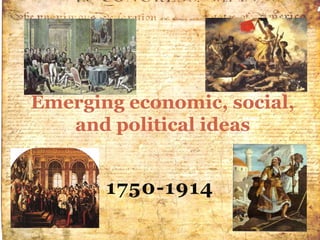
5a_ideologies.ppt
- 1. 1750-1914 Emerging economic, social, and political ideas
- 2. What is ideology? Ideology is ‘an interrelated set of ideas that in some way guides or inspires political action’. ‘An ideology is a reasonably coherent structure of thought shared by a group of people. It is a means of explaining how society works and explaining how it ought to work.’
- 3. Copy two examples from each category of Ideologies
- 4. Movements inspiring 19th-century ideologies The Enlightenment its ideals of reason, progress, secularism, and the liberty of the (male) individual. The French Revolution – experiments in social engineering, radical republicanism, critique of all established norms (including the family and private property), state-building and the formation of national identity. Industrialization – the advent of a capitalist order of bourgeoisie -- with comfort, security, and ownership -- over laborers mired in poverty and a host of other social ills.
- 5. Left and Right: The Political Spectrum The most common comparative model of ideological preference Left Wing Right Wing Liberalism Conservatism Centrism Socialism Communism Statism Fascism
- 6. Democracy The beginnings of democracy can be traced back to the Greeks. Pericles (495-429 BC) declared that ancient Athens (Greece) was a democracy because “power rested in the hands of the many instead of the few”. As an idea it is probably best summed up by Abraham Lincoln, “government of the people, by the people, for the people”. The Trial of Socrates
- 7. COUNTRIES THAT EMBRACE DEMOCRACY
- 8. Democratic Ideologies: Liberalism Liberalism is defined as a philosophy, which is committed to the ideology of limited government, freedom of speech, religion, assembly, press and free markets. It advocated a specific kind of government, public policy and society required as a result of the urbanization and industrial revolution. John Stuart Mill
- 9. Democratic Ideologies: Capitalism Capitalism is defined as a social and economic system where capital assets are mainly owned and controlled by private persons, where labour is purchased for money wages, capital gains accrue to private owners. Adam Smith The Wealth of Nations Adam Smith claimed that people who trade with each other don’t go to war with each other.
- 10. Democratic Ideologies: Conservatism Conservatism is a political and social philosophy that promotes retaining traditional social institutions. • A stable society should be based on the church, the state and the family. • Conservatives held that old established institutions were to be preserved: MONARCHY, ARISTOCRACY, and the CHURCH. • Faith, history and tradition should replace reason and excessive belief in individual rights. • Change, if it comes, must be gradual and must take into account the country’s history and traditions. Edmund Burke Wrote “Reflections on the Revolution in France” (1790)
- 11. Socialism The term socialism stems from theories that try to improve the miserable lot of the urban industrial working class. Various forms of socialism have in common the goal of subjecting property to the control by the community or the state at the expense of private or individual interest. More radical forms of socialism sought the abolition of private property. In the C19th, socialism became a popular theory because some people thought that living and working conditions would improve if there were greater government intervention and regulation. Noel Babeuf Robert Owen
- 12. Communism The central ideas were: The abolition of private property no longer be a separation of society based upon social and economic class
- 13. Social Darwinism: Survival of the Fittest Social Darwinists believed that the strongest or fittest should survive and flourish in society, while the weak and unfit should be allowed to die. In the 18th century it was used to back up the common belief that the poor were ‘undeserving’ and held back by their own lack of effort. Imperialists and slave traders also used it as justification: right to rule and subjugate.
- 14. Egalitarianism In an egalitarian society, all people have equal social, political and economic status, considered to be a ‘classless’ society: there is no upper, middle or lower classes –everyone is considered equal.
- 15. Imperialism State policy, practice, or advocacy of extending power and dominion, especially by direct territorial acquisition or by gaining political and economic control of other areas.
- 16. Nationalism Nationalism is a state-based ideology. Intended to promote the construction and maintenance of the nation state. Nationalism can be a powerful force in unifying people in a country. It makes people feel that they share a similar past, present and future. Loyalty and devotion to one's nation or country, especially as above loyalty to other groups or to individual interests. Nationalism is also used to justify imperialism. It can also become racist when one nation sees itself as superior to others. For the extreme think of Nazi Germany! Spirit of Nationalism
- 17. Militarism The belief that a country should maintain a strong military capability and be prepared to use it aggressively to defend or promote national interests. At the height of the British Empire, photographs of naval and military commanders were a popular subject for eagerly collected cigarette cards. The one shown here, from the turn of the 20th century, depicts then-Captain Jellicoe.